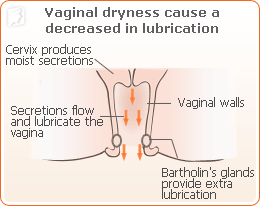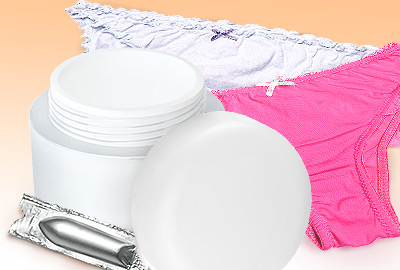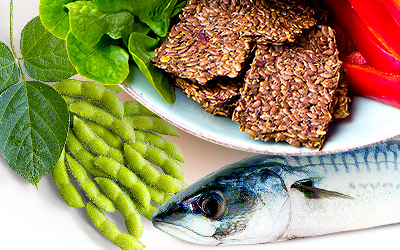Vaginal dryness is one of many symptoms women can encounter as they approach menopause. The condition most commonly occurs when the vagina's natural lubrication becomes reduced. Women can experience this symptom at all ages, it is however, most common during menopause.
Prior to menopause, vaginal dryness is prevented by mucus membranes or the vaginal epithelium which can be found at the uterus. Generally Estrogen helps epithelium produce the lubrication which keeps the vagina moist. Therefore, when estrogen levels drop during menopause, vaginal dryness can be just one consequence. This vaginal moisture, being mildly acidic, also has a secondary purpose, that of fighting bacteria and keeping a woman free from infection.
Causes of Vaginal Dryness
Although hormones are most frequently the culprit, there are many factors that can cause and contribute to vaginal dryness.
Hormonal cause

Vaginal dryness occurs most commonly as a symptom of menopause because of decreased estrogen levels. This symptom is just one of the many consequences of the physical changes menopause triggers. When vaginal secretions decrease, vaginal dryness can lead to discomfort during intercourse and everyday life.
Other causes
In certain, infrequent cases, vaginal dryness isn't as a result of menopause symptoms. Other potential causes include:
- Medications for cancer treatment
- Chronic yeast infection
- Sjogren's syndrome
Menopause Symptoms:
Vaginal dryness is most likely to affect women as they approach the end of their fertile life. This menopause symptom occurs when the body loses its ability to sufficiently reproduce the hormones that the body needs in order to maintain its fine balance. Other menopause symptoms can include: irregular periods, weight gain, memory lapses, and changes in body odor.
Although the above causes are uncommon, if you have reason to be concerned about their likelihood, it is advised that you discuss your symptoms with a doctor. However, in the more likely case that our vaginal dryness is identified as a menopause symptom, there are a range of treatment options that can help counter the effects of this condition.
Vaginal Dryness Treatments
Most treatments for vaginal dryness as a menopause symptom aim to tackle the condition at its root cause: the deficiency in hormone levels. It is always wise to try non-invasive options first, including maintaining a healthy body. Alternative medicine and exercise programs can be used in conjunction with this approach to fully counter the effects of vaginal dryness.

Hormone replacement therapy (HRT) is one of the most effective and widely used treatments by women who are suffering from vaginal dryness as a menopause symptom. However, despite, it's high success rate, HRT should not be taken lightly as it comes with the risk of triggering serious side effects.
Vaginal dryness is one of the most common menopause symptoms women can encounter. It is also however, one of the most invasive and frustrating. Central to finding relief from this natural condition is understanding it.
Sources
- Love, Susan M.D. Menopause and Hormone Book. New York: Three Rivers Press, 2003.
- The Changing Body: Menopause Handbook.(n.d)."Vulvovaginal Symptoms". Retrieved from www.menopause.org
- "Vaginal Dryness". Mayo Clinic Health Resource. 2007



